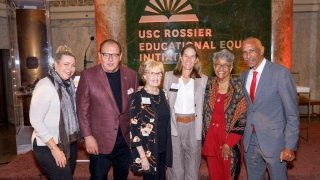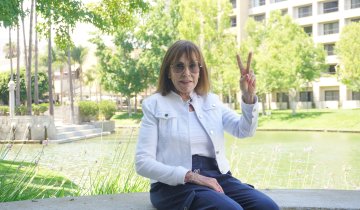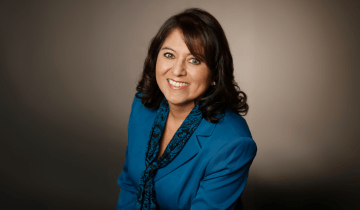Surrounded by education advocates and USC Rossier supporters, Dean Pedro A. Noguera launched the USC Rossier Educational Equity Initiative in the fall at the Natural History Museum of Los Angeles County. The ambitious initiative consists of five priority projects designed to create transformative educational opportunities for children in Los Angeles and across the country.
In his opening remarks, Dean Noguera reflected on the goals he set for USC Rossier when he joined theschool in 2020, asking, “How do we create the change our system so desperately needs? What can we at USC Rossier do that no one else can?” Launching the Educational Equity Initiative was the answer.
But what does it mean to advance educational equity? USC Rossier’s vision is to create a world in which schools are responsive to the unique needs of every child and learning leads to an expansion of the opportunities available to them throughout their lives.
The projects of the new initiative include partnering with four existing Los Angeles Unified School District schools to train and support teachers; an expansion of USC Rossier’s Teacher Residency Program; a new USC Rossier STEAM Teaching and Research Center; the Los Angeles Education Policy Solutions Hub, which will conduct research and analyze data that will be used to diagnose educational conditions and inform decision-making at L.A. schools and colleges; and the USC Democracy Project, which aims to prepare students to engage in civil discourse and participate in democracy at all levels. All five projects are designed to “give kids an education so they can accomplish anything they aspire to,” said Noguera.
As part of the Educational Equity Initiative, USC Rossier will work directly with LAUSD to train new teachers, support existing teachers with professional development in instructional best practices and provide critical social services to children and families. “The future of teaching is more threatened than it has ever been in our society,” said USC Rossier Board of Councilors Chair Reveta Franklin Bowers BA ’70, who spoke at the launch. “Rossier is place-based, located in the middle of a community that needs quality teaching as much as any place in our country.”
At a time when a deepening partisan divide is threatening the foundations of our democracy, the Democracy Project is rethinking how civic education can meet this challenging moment. “In some ways, I believe the education system has lost its center,” said USC Rossier Board of Councilors member Gary Crisp, who was also in attendance. “I want to support the next generation of children to be the best they can be, live their dreams and have the right tools to succeed in life.”
The Democracy Project will provide teachers with a curriculum to help students learn about complex issues while simultaneously teaching them how to conduct independent research and engage in civil discourse.
Expanding the Teacher Residency Program will provide more than 30 talented, bright students with a fully funded Master of Arts in Teaching degree, a living stipend and a two-term teacher residency where they work intensively, side by side with a mentor teacher, adequately preparing them for the challenges ahead. “Our institution is committed to ensuring that school leaders are prepared to face the challenges of today as well as create equitable learning environments through the establishment of practices and systems that ensure positive learning outcomes for all students,” said USC Board of Councilors member Patricia Brent-Sanco EdD ’16.




